This article was medically reviewed by Lewis Chen, DDS, FICOI, FIADFE. Dr. Lewis Chen is a licensed Dentist in both New York and New Jersey, specializing in providing high-quality oral care in the form of preventative care. He holds an Economics degree from New York University. Dr. Chen earned his doctorate at Columbia University College of Dental Medicine. He graduated top of his class with the highest honors and distinction and was nominated and inducted into the only renowned, national dental honor society, Omicron Kappa Upsilon (OKU). He then completed a comprehensive training program at the Bronx VA Medical Center and, shortly after, decided to pursue multiple practice ownership and management. Dr. Chen has acquired numerous accolades over the years, including New York Academy of Dentistry Exemplary Professional Conduct Award, Academy of General Dentistry Outstanding General Practitioner Award, American Academy of Implant Dentistry Award, and Pierre Fauchard Foundation Award.
wikiHow marks an article as reader-approved once it receives enough positive feedback. In this case, 100% of readers who voted found the article helpful, earning it our reader-approved status.
This article has been viewed 70,926 times.
Your first week wearing braces is notoriously the worst. Between pulsing pain, the annoying tight feeling of the wires, and the uncomfortable metal rings around your back teeth, let's just say the first week won't be your best week ever. If you have invisible braces, you'll avoid the irritation of metal bands, but your mouth will still be very sore as your teeth begin to shift. But braces are definitely worth all the trouble. When your doctor finally takes them off, it's a wonderful feeling. And your friends will all be jealous because your teeth will look amazing!
Steps
Minimizing the Pain
-
1Stock up on painkillers. Over the counter medicine such as Advil, Tylenol, and Ibuprofen work miracles during your first week. Your doctor will tell you which ones are best for you and when to take them to reduce your pain. It will be much easier on your sensitive teeth.[1]
- Never take more than the recommended dose. Overuse of ibuprofen and aspirin can damage your stomach lining and cause severe pain and bleeding ulcers.
- The liquid versions of these medications will be easier on your teeth than the chewable pills.
-
2Use an ice pack. Press an ice pack against your cheek until the swelling goes down. Icing will also temporarily numb your gums and relieve some of the pain.
- If you don't have an ice pack, use a bag of frozen peas. Wrap the bag in a paper or cloth towel and gently press it on your cheek for up to 15 minutes. You can do this two or three times a day.
Advertisement -
3Use a topical anesthetic. Over-the-counter oral anesthetics like Anbesol or Orajel will numb any painful areas in your mouth, and keep them from hurting for a few hours. Put a small amount on a Q-Tip and rub it on your gums around sore teeth, or on any sores in your mouth. These medications taste pretty terrible, but it's a good way to get rid of the pain so you can sleep at night.
-
4Drink cold water. Keep ice water handy at all times, and remember to drink it. You can also hold it in your mouth for a few minutes and swish it gently. The cold temperature helps numb the feeling of the metal rings on the sides of your tongue. Keeping yourself properly hydrated will also help speed the healing process.
- Drink plenty of water, but avoid soft drinks because these have a high percentage of sugar and acid.
-
5Try clove oil. Clove oil will reduce inflammation and pain in your mouth. You can buy it at most health food stores and drug stores.[2]
- Apply clove oil directly to swollen gums on the end of a Q-Tip.
- Mix a few drops of clove oil in water, and swish it your mouth for a minute or two.
-
6Distract yourself. Studies show that when you aren't thinking about your pain, you don't feel it as much. Go see a movie or go for a run, whatever floats your boat.[3]
-
7Take it easy. Don't do anything that makes your teeth hurt. Rest as much as you can, and avoid hard foods or anything else that might make your mouth hurt.
Taking Care of Your New Braces
-
1Avoid nervous chewing habits. Don't chew your fingernails, or chew on your pen or pencil in class. Try not to chew your ice when you finish your drink. And ignore those people who say it's okay to chew gum – they aren't the ones who will have a painful trip to the orthodontist when their braces are damaged by bubble gum.[4]
- Your teeth are already under constant tension from the braces, which causes inflammation. Don’t create put any extra pressure on them by chewing gum.
-
2Rinse your mouth with salt water. Salt destroys bacteria in your mouth, which helps your wounds heal faster and promotes an alkaline pH, which reduces the acids. A salt water wash won't irritate the mucous membranes in the mouth like a commercial mouthwash would.
- Mix ½ teaspoon of salt into one cup of warm water.
- Rinse your mouth every 2 to 3 hours the first day, then 3 to 4 times a day until your mouth heals.
-
3Eat soft foods. You might want to stick to liquids for the first day or two, if your mouth is especially tender. Then stick to soft foods until your mouth feels normal again.
- Stock up on yogurt, mashed potatoes, soup, rice, smoothies, and pudding.
- Look on the bright side: you have a great excuse for polishing off that big tub of chocolate ice cream in the freezer.
-
4Wear a mouth guard. If you play any sports where you might get hit in the mouth, be sure to wear an orthodontic mouth guard. The metal brackets of your braces can easily cut the soft tissue of your lips, cheeks or even tongue. They may not look cool, but you will definitely be grateful for it if you take a soccer ball to the face.[5]
- You can find mouth guards at most sporting goods stores.
- Your orthodontist's office may also carry mouth guards for this purpose.
-
5Massage your gums. This can help relieve the pain of swollen gums and stimulate the blood flow reducing inflammation.[6]
- Press a clean toothbrush against the swollen areas of your gum for about half an hour.
- If you don't have a toothbrush handy, press lightly on the affected areas with your finger or use a gum stimulator.
Keeping Your Spirits Up
-
1Catch some zzzs. You may want to binge watch Netflix tonight, but sleep will help your body adjust to the braces. Besides, when you are asleep, you can't feel your braces hurt.
-
2Listen to music. Studies show that listening to music can help ease pain and anxiety after surgery, and the same holds true for any time you are in pain. Put on your headphones, crank up your favorite tunes, and you are sure to feel a lot better.
-
3Talk to a friend who has braces. It always helps to talk to someone who has gone through the same things that you have. Your friend can help ease your anxiety and reassure you that the pain will go away in time. They also probably have some good tips for what to do, and what not to do. Learn from their mistakes, so you don't have to experience it yourself.[7]
-
4Hang in there. Remember that this week will end, and you will be back to normal in no time. Try to focus on the end results and how happy you'll be with your new smile.[8]
Expert Q&A
-
QuestionShould I sleep on my back or is it okay to sleep on my side?
 Cristian Macau, DDSDr. Macau is an oral surgeon, periodontist, and aesthetician at Favero Dental Clinic in London. He received his DDS from Carol Davila University of Medicine in 2015.
Cristian Macau, DDSDr. Macau is an oral surgeon, periodontist, and aesthetician at Favero Dental Clinic in London. He received his DDS from Carol Davila University of Medicine in 2015.
Doctor of Dental Surgery You can’t really control your position while you are sleeping. When you get into bed, just try to avoid any position that hurts your cheeks or lips, such as sleeping face down or sideways. If you can’t sleep on your back,then apply some wax on the brackets before going to bed so you can have a bit of protection from the brackets.
You can’t really control your position while you are sleeping. When you get into bed, just try to avoid any position that hurts your cheeks or lips, such as sleeping face down or sideways. If you can’t sleep on your back,then apply some wax on the brackets before going to bed so you can have a bit of protection from the brackets.
References
- ↑ Lewis Chen, DDS, FICOI, FIADFE. Licensed Dentist. Expert Interview. 11 May 2021.
- ↑ http://www.newhealthadvisor.com/Swollen-Gums-with-Braces.html
- ↑ http://www.livescience.com/18361-distraction-reduces-pain.html
- ↑ http://www.thinkbraces.com/services/braces-care/
- ↑ http://www.thinkbraces.com/services/braces-care/
- ↑ http://www.newhealthadvisor.com/Swollen-Gums-with-Braces.html
- ↑ http://childdevelopmentinfo.com/child-teen-health/dental_information/teens-braces/
- ↑ Lewis Chen, DDS, FICOI, FIADFE. Licensed Dentist. Expert Interview. 11 May 2021.
About This Article
Your first week in braces may feel terrible, but you can get through it by eating soft foods and finding ways to manage pain. You'll need to eat liquids for the first couple of days, such as soups or smoothies. Then, you can move on to soft foods, like mashed potatoes, rice, or ice cream. During the first day, rinse your mouth with salt water every 2 to 3 hours to help heal your sores and remove bacteria. After day 1, continue to rinse your mouth 3 to 4 times a day until it heals completely. Take over-the-counter painkillers like Advil or Ibuprofen if you’re struggling with pain. You can also press an ice pack against your cheek for 10 to 15 minutes to help reduce painful swelling. For tips from our Dental co-author on what to do with your braces if you play sports, read on!



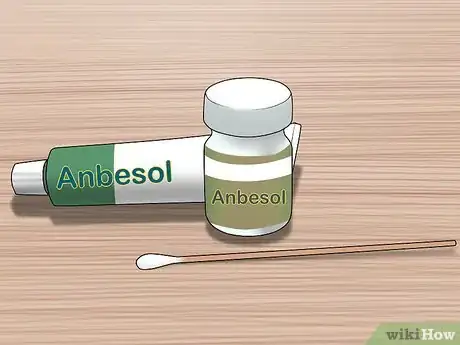

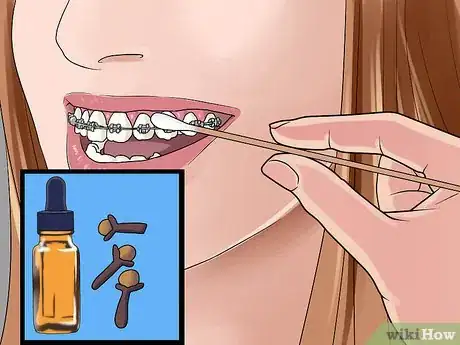

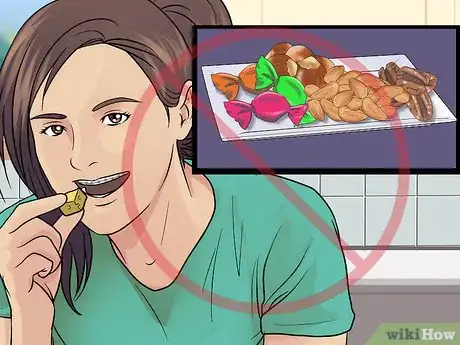
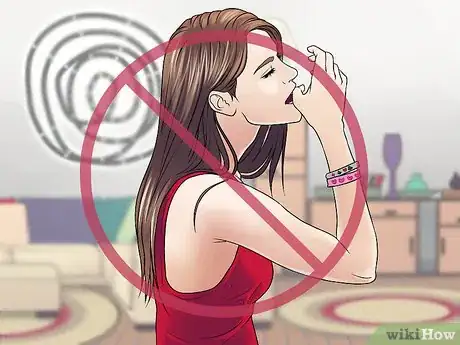

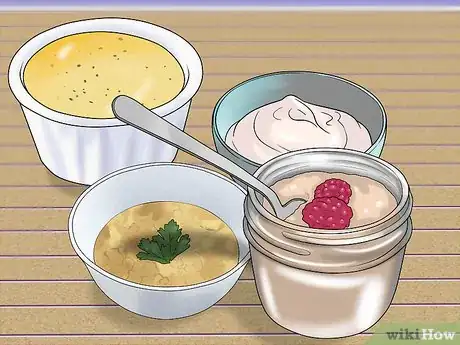
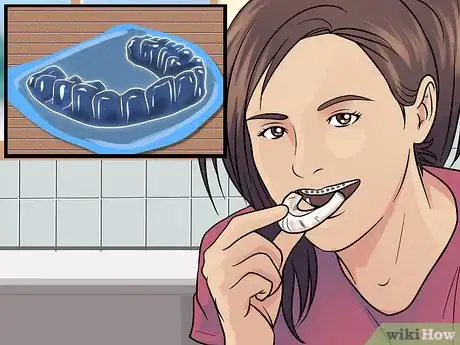
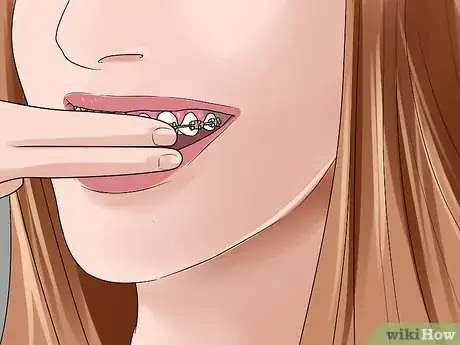


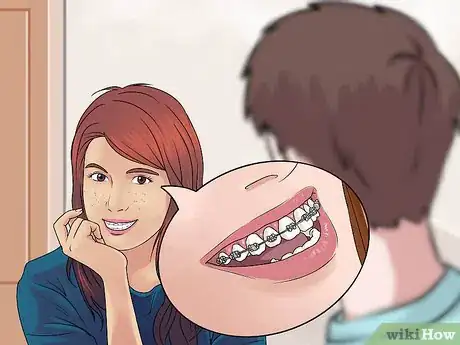

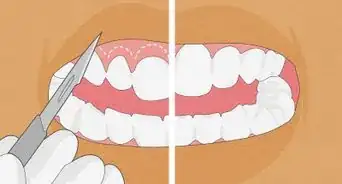

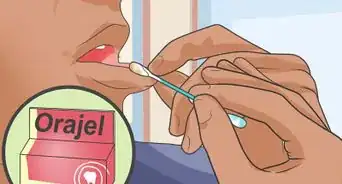

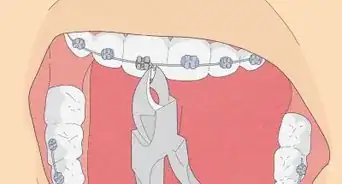
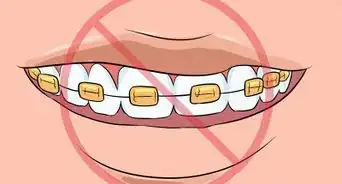
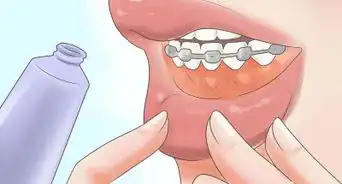
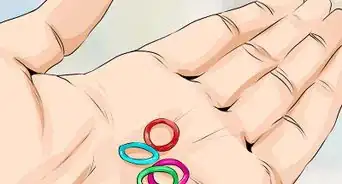
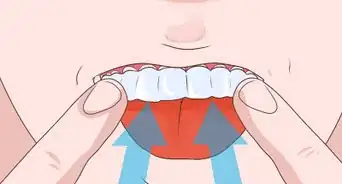

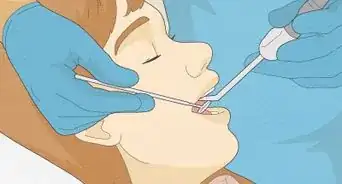
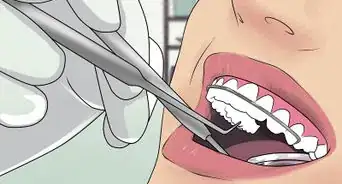
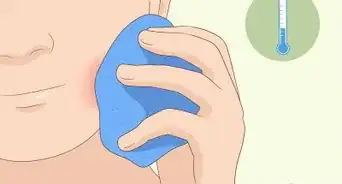









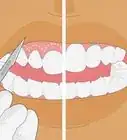

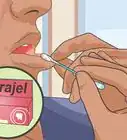





































Medical Disclaimer
The content of this article is not intended to be a substitute for professional medical advice, examination, diagnosis, or treatment. You should always contact your doctor or other qualified healthcare professional before starting, changing, or stopping any kind of health treatment.
Read More...